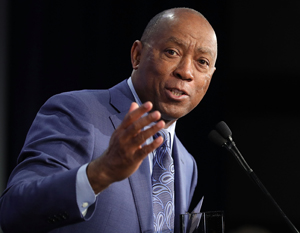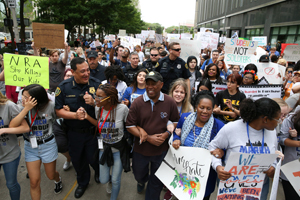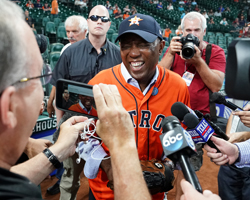
Sylvester Turner is near the end of his first four-year term as mayor and is up for re-election for what would be his second and final term as Houston’s mayor. Intown Magazine is taking a look at the major issues Mayor Turner has faced and how he has dealt with them. We also conducted exclusive interviews with four of the top challengers Mayor Turner faces at the polls on November 5, 2019.
Flooding
Two of the three 500-year floods to hit Houston came during Mayor Turner’s administration. Hurricane Harvey in 2017 devastated the city. Over 50 inches of rain impacted more than 200,000 homes. Sixty thousand people had to be rescued from floodwaters. Damages totaled nearly $16 billion.
After sheltering 10,000 people at the George R. Brown Convention Center, removing 575,000 tons of debris and setting up 14 Neighborhood Restoration Centers to provide assistance to residents, Mayor Turner moved to prevention and flood mitigation to build Houston stronger, more resilient and more sustainable.
Though controversial with some developers, the Mayor won City Council approval for new construction standards requiring elevation of homes in flood plains, along with revising city building codes. He re-named the city’s ReBuild Houston infrastructure program; it’s now Build Houston Forward with accelerated plans to repair and rehabilitate drainage and streets.
He fought for state and federal government funding after Hurricane Harvey, which is finally coming in, convincing FEMA to accept the many thousands of volunteer hours from Houstonians as part of the local match for federal funds.
Mayor Turner won federal grant money for major flood mitigation projects and FEMA approval for the Corps of Engineers to dredge the San Jacinto River. He borrowed $46 million from the Texas Water Development Board and gave it to Harris County for work on Project Brays, with the city to be paid back when the federal government pays the county its portion. He supported the county’s flood bond referendum.
 Jobs and the Economy
Jobs and the Economy
The biggest financial crisis facing the Mayor on his first day in office was the unfunded liability of the city’s employee pension systems. Mayor Turner, with the help of the Texas Legislature, cut the unfunded liability and the city has fully paid its pension obligation for two years in a row.
Mayor Turner formed an alliance with Microsoft, who will work with young Houstonians on STEM education (science, technology, engineering and math) and digital coursework, as well as assisting the city with smart solutions to problems.
Mayor Turner supported Rice University’s purchase of the old Sears building to start The Ion with academic programs created by local colleges and universities.
Mayor Turner has traveled to multiple countries to bring jobs and business back to Houston. He recently helped secure Houston as the location for the 2020 World Petroleum Congress, which will bring approximately 10,000 attendees from around the world.
Public Safety
Turner acknowledges that Houston needs more police officers. With 5,200 officers, Houston trails other major cities in officers per 100,000 residents.
In 2016, Turner’s first year in office, crime was on the rise with 301 murders. The Mayor put an additional $1.5 million in the Houston Police Department due to the murder rate increase.
In 2018 murders were at 279 up from 269 in 2017, while overall crime reported decreased 4.39 percent; violent crime dropped 10.4 percent. Robberies, rapes and aggravated assaults declined.
Mayor Turner hired Art Acevedo as his police chief, the first Latino to lead HPD. Acevedo brought the concept of “relational policing,” to HPD—an attitude that every time a police officer interacts with a member of the public, it is an opportunity to build a relationship of trust with the community.
After the shootings in Santa Fe, he appointed the Mayor’s Anti-Gun Violence Commission. The Commission made a number of recommendations and suggestions for changes in state law were sent to the Texas Legislature and the Mayor had his government relations team working to pass them.
Mayor Turner made the fight against human trafficking a high priority. His Anti-Human Trafficking Strategic Plan focuses on the victims of trafficking and how to help them, as well as on law enforcement. City employees received special training to help them recognize human trafficking and assist victims. The Mayor’s Special Advisor on Human Trafficking, Minal Patel Davis, won the prestigious Presidential Award for Extraordinary Efforts to Combat Trafficking in Persons, the highest U.S. award for this issue.
